Intel's Core i7 870 & i5 750, Lynnfield: Harder, Better, Faster Stronger
by Anand Lal Shimpi on September 8, 2009 12:00 AM EST- Posted in
- CPUs
3dsmax 9 - SPECapc 3dsmax CPU Rendering Test
Today's desktop processors are more than fast enough to do professional level 3D rendering at home. To look at performance under 3dsmax we ran the SPECapc 3dsmax 8 benchmark (only the CPU rendering tests) under 3dsmax 9 SP1. The results reported are the rendering composite scores:
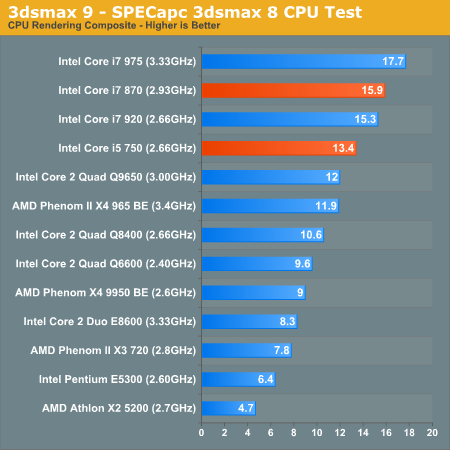
And we're back down to utter dominance yet again. The i5 750 is 12.6% faster than the Phenom II X4 965 BE and 18.8% cheaper. Harder, better, faster stronger.
Blender 2.48a
Blender is an open source 3D modeling application. Our benchmark here simply times how long it takes to render a character that comes with the application.
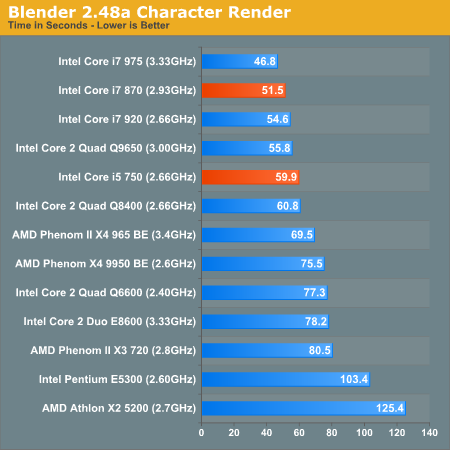
To get Blender to perform right on Lynnfield we actually had to update our graphics drivers. It looks like the on-die PCIe does require the latest NVIDIA/ATI drivers to work properly. The results aren't unusual; Intel has done very well in these tests and Lynnfield continues to dominate. The i5 750 is a bit slower than the 920 (and Q9650) thanks to its missing HT support.
Cinebench R10
Created by the Cinema 4D folks we have Cinebench, a popular 3D rendering benchmark that gives us both single and multi-threaded 3D rendering results.
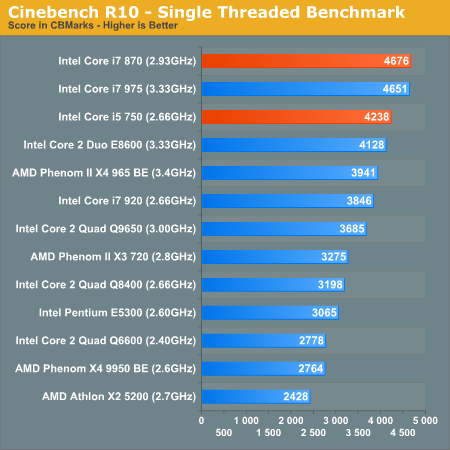
The single threaded benchmark tells us everything we need to know. The Core i5 750 and i7 870 are two of the fastest processors we've ever tested at single-threaded applications. Very few microprocessors will be able to retire instructions from a single thread as quickly as Lynnfield. This is actually very noticeable in simply using the OS. Many tasks still aren't multithreaded but they execute very, very fast on Lynnfield.
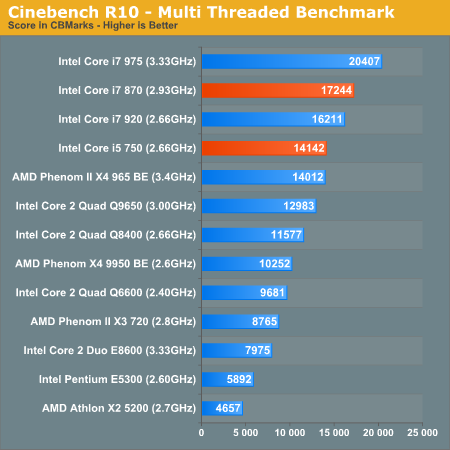
Crank up the threads and Lynnfield is still competitive. Because it's missing Hyper Threading, the i5 750 is barely faster than the Phenom II X4 965 BE. Although I understand Intel wanting to segment its product line, it seems that the i5's missing HT goes a bit too far.
POV-Ray 3.73 beta 23 Ray Tracing Performance
POV-Ray is a popular, open-source raytracing application that also doubles as a great tool to measure CPU floating point performance.
I ran the SMP benchmark in beta 23 of POV-Ray 3.73. The numbers reported are the final score in pixels per second.
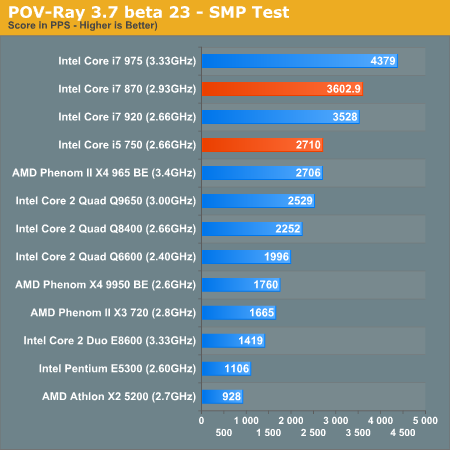
We see the same results under POV-Ray. Regardless of thread count, Lynnfield delivers the best performance possible short of a $1000 CPU.










343 Comments
View All Comments
jnr0077 - Thursday, July 26, 2012 - link
well i have the better model i5 750 1156 socket gaming score is 5.9 on basic 500 gb hd 7200 with a ssd it hit 7.9 on a gigabyte GA-P55A-UD6 12gb ram. as for the pricecost was cheep intel (R)quad core (TM) i5 750 @2.66 GHz 2.67GHz cost around £100 mobo cost me £100 i though it is a very cheep upgrade considering price i wood like to here what score any Pehnom II X4 965 hit
Milleman - Sunday, September 13, 2009 - link
The article itself is good. But Why on earth compare a standard clocked CPU (AMD) against overclocked ones (Intel). Makes no objective sense att all. I's like having a car test between a standard car and a tuned racecar. Of course the racecar will win in performance. The overclock results shouldn't be there at all. Maybe as a remark that tell what will happen if one would like to overclock. Looks rather unfair and biased.So... why??
Nich0 - Sunday, September 13, 2009 - link
All I saw in this article is comparison of CPUs in their stock configuration. What's wrong with that?Bozo Galora - Friday, September 11, 2009 - link
I must say this was a very good logical coherent review with just about all the info one would requireGood job - I had no intention of getting one of these, but now I may change my mind
IntelUser2000 - Thursday, September 10, 2009 - link
http://www.intel.com/support/processors/sb/CS-0299...">http://www.intel.com/support/processors/sb/CS-0299...According to Intel...
Core i7 870:
5/4/2/2
Core i7 860:
5/4/1/1/
Core i5 750:
4/4/1/1
So the i7 870 has higher Turbo mode for 3 and 4 cores than 860 does.
Nich0 - Friday, September 11, 2009 - link
Yeah and that means that the OC numbers for the 750 with Turbo don't make sense. For example 4160 / 160 = 26 which would be a Turbo of 6 BCLK.Same thing for the 860 OC 3C/4C Turbo number.
Am I missing something?
IntelUser2000 - Friday, September 11, 2009 - link
Its likely Anand has ES versions or such which allows multiplier adjustments. But at stock, the linked speeds are the Turbo Boost grades.Nich0 - Friday, September 11, 2009 - link
Yeah obviously I am not disputing the stock OC with Turbo enabled (that sounds weird: stock OC?), ie 160*20= 3200, but just what it means in terms of Turbo: it 'should' read 3.36 for 3/4C and 3.84 for 1/2C if the 1/1/4/4 Turbo spec is correct.rdkone - Thursday, September 10, 2009 - link
I don't like the fact that the BCLK directly and synchronously communicates with PCIe buss, thus affecting the videocard negatively (among other PCIe cards)... This is like overclocking years ago whereas the PCI bus would be affected in the same way and causing headaches... This is a major issue I feel for those wanting to push a fairly big overclock on these CPU's... Intel screwed the pooch for us overclockers I feel... Just more justification to limp along with my core 2 quad at 4.1Ghz rock solid... Like others have said, is funny how the articles don't show older CPU overclocks against all this new garb... In the past they used to... But that hurts sales : )SnowleopardPC - Thursday, September 10, 2009 - link
Ok, so what type of boost do I get over a Q6600 with 8gb of ram and windows 7 64?Is it worth upgrading or waiting for that 6 core 32nm to come out next year?
To upgrade to any of these I will need to replace a motherboard and ram with the processor.